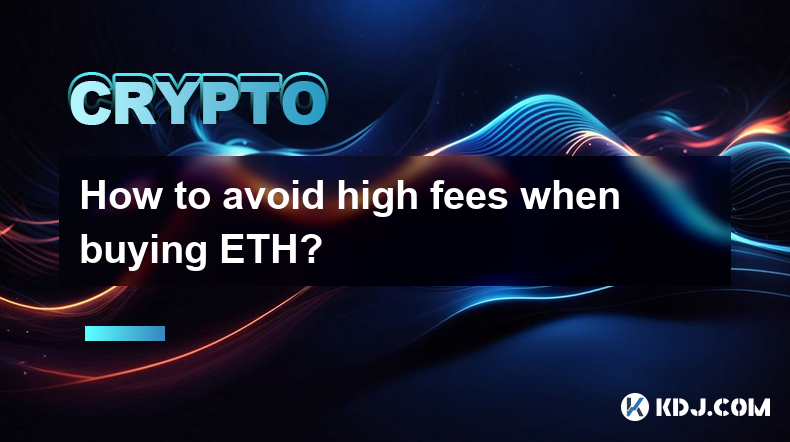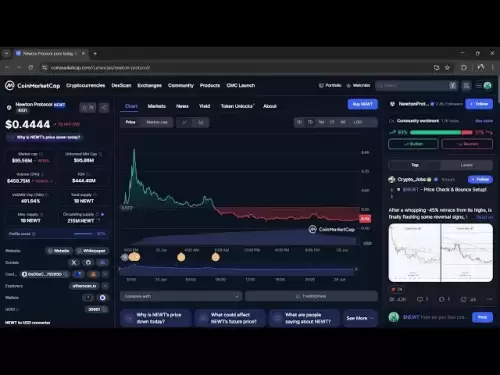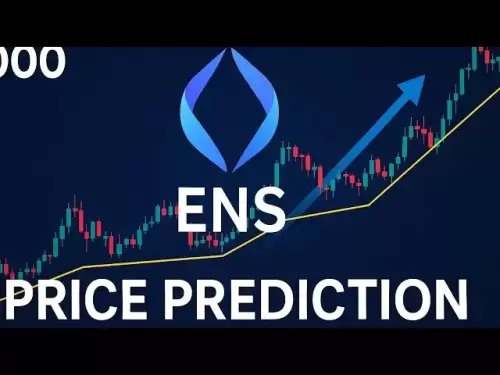-
 Bitcoin
Bitcoin $107,467.9126
1.26% -
 Ethereum
Ethereum $2,447.5288
-0.12% -
 Tether USDt
Tether USDt $1.0005
0.00% -
 XRP
XRP $2.1921
0.13% -
 BNB
BNB $647.2897
0.50% -
 Solana
Solana $144.8627
-0.37% -
 USDC
USDC $0.9996
-0.03% -
 TRON
TRON $0.2732
0.10% -
 Dogecoin
Dogecoin $0.1652
-0.18% -
 Cardano
Cardano $0.5700
-2.87% -
 Hyperliquid
Hyperliquid $37.0274
-1.81% -
 Bitcoin Cash
Bitcoin Cash $484.6957
0.19% -
 Sui
Sui $2.7354
-2.19% -
 Chainlink
Chainlink $13.1727
-1.49% -
 UNUS SED LEO
UNUS SED LEO $8.9978
-0.04% -
 Stellar
Stellar $0.2421
-2.33% -
 Avalanche
Avalanche $17.5633
-3.51% -
 Toncoin
Toncoin $2.8476
-1.94% -
 Shiba Inu
Shiba Inu $0.0...01166
-0.56% -
 Litecoin
Litecoin $85.1071
0.09% -
 Hedera
Hedera $0.1502
-2.96% -
 Monero
Monero $310.2774
-1.64% -
 Dai
Dai $0.9999
-0.01% -
 Polkadot
Polkadot $3.3584
-1.88% -
 Ethena USDe
Ethena USDe $1.0003
-0.04% -
 Bitget Token
Bitget Token $4.4443
2.90% -
 Pi
Pi $0.6242
14.04% -
 Uniswap
Uniswap $6.9774
-2.86% -
 Pepe
Pepe $0.0...09535
-5.05% -
 Aave
Aave $256.7574
-3.35%
How to avoid high fees when buying ETH?
Minimize ETH fees by choosing low-fee exchanges, buying during off-peak hours, using Layer-2 solutions, batching transactions, and adjusting gas prices strategically.
Mar 27, 2025 at 01:49 pm

Understanding Ethereum Transaction Fees (Gas Fees)
Ethereum transaction fees, commonly known as gas fees, are the cost associated with processing transactions on the Ethereum network. These fees are paid in ETH to miners who validate and add your transaction to the blockchain. The amount you pay depends on two primary factors: the gas price (how much you're willing to pay per unit of gas) and the gas limit (the maximum amount of gas your transaction might consume). High gas prices, often driven by network congestion, lead to high transaction fees.
Strategies to Minimize ETH Purchase Fees
Several strategies can help you minimize the fees you pay when buying ETH. The optimal approach depends on your urgency and technical comfort level.
Choose the Right Exchange: Different cryptocurrency exchanges charge varying fees. Some exchanges may offer lower trading fees or even zero-fee options for specific trading pairs. Research and compare fees before choosing a platform. Consider factors beyond just the trading fee, including deposit and withdrawal fees.
Buy ETH During Off-Peak Hours: Network congestion is a major driver of high gas fees. Transaction fees tend to be lower during periods of lower network activity. Experiment with purchasing ETH during off-peak hours, often late at night or early morning in your time zone. This requires some flexibility.
Use Layer-2 Solutions: Layer-2 scaling solutions like Polygon, Optimism, and Arbitrum process transactions off the main Ethereum network, significantly reducing gas fees. You can buy ETH on these layer-2 networks and then bridge it to the main Ethereum network when needed, incurring lower fees overall. However, this involves additional steps.
Batch Transactions: If you need to perform multiple transactions, consider batching them together. This reduces the overall number of transactions, lowering the total gas fees. Many wallets and decentralized applications (dApps) offer batch transaction capabilities.
Adjust Gas Price Settings: Most wallets allow you to manually adjust the gas price. Setting a slightly lower gas price can save you money, but it may also increase the time it takes for your transaction to be confirmed. This is a balance between speed and cost. You need to be aware of potential delays.
Utilize a Decentralized Exchange (DEX) with Lower Fees: Some DEXs have lower transaction fees compared to centralized exchanges (CEXs). However, DEXs often require more technical knowledge to use. Be sure to understand the platform's mechanics before using it.
Consider Using a Different Cryptocurrency: If your primary goal is to access decentralized finance (DeFi) applications on Ethereum, consider using a different cryptocurrency with lower transaction fees to interact with those applications. This might involve converting your assets later.
Understanding Gas Price and Gas Limit
Gas Price: This is the price you're willing to pay per unit of gas. A higher gas price increases your chances of faster transaction confirmation. The gas price is typically expressed in Gwei (1 Gwei = 0.000000001 ETH).
Gas Limit: This is the maximum amount of gas your transaction is allowed to consume. Setting a gas limit too low can result in transaction failure. Most wallets automatically estimate the gas limit for you, but you can adjust it if needed. Ensure you understand the implications before adjusting.
Choosing the Right Wallet
Your choice of wallet can also influence transaction fees. Some wallets offer better gas fee optimization features than others. Research and compare different wallets to find one that suits your needs and offers efficient gas fee management. Consider the security features and user experience as well.
Timing Your Purchases Strategically
Monitoring network activity and buying ETH during periods of low congestion can significantly reduce transaction fees. Various websites and tools track gas prices in real-time, allowing you to time your purchases strategically. Patience is often rewarded with lower fees.
Exploring Alternative Methods
For larger ETH purchases, consider using a custodian or a specialized service that facilitates large transactions and potentially negotiates lower fees. This approach may be more suitable for institutional investors or high-volume traders.
Frequently Asked Questions
Q: What is the average ETH gas fee?
A: The average ETH gas fee is highly variable and depends on network congestion. It can range from a few cents to tens of dollars, sometimes even more during periods of high demand. There's no fixed average.
Q: Can I avoid gas fees altogether?
A: No, gas fees are inherent to the Ethereum network. They compensate miners for processing transactions. However, you can minimize them using the strategies discussed above.
Q: Are gas fees the same for all transactions?
A: No, gas fees vary based on the complexity of the transaction. More complex transactions, such as smart contract interactions, generally require more gas and therefore incur higher fees.
Q: How can I monitor ETH gas prices?
A: Several websites and tools provide real-time gas price tracking. Many wallets also display current gas price estimations. Look for reputable sources to get accurate information.
Q: What are Layer-2 solutions, and how do they help reduce fees?
A: Layer-2 solutions are technologies that process transactions off the main Ethereum blockchain, reducing congestion and lowering gas fees. They then settle transactions on the main chain periodically.
Q: Is it safe to use Layer-2 solutions?
A: The security of Layer-2 solutions varies depending on the specific implementation. Reputable Layer-2 solutions employ robust security measures, but it's crucial to research and choose a trusted provider.
Q: What happens if I set my gas price too low?
A: If you set your gas price too low, your transaction might not be included in a block for a long time or may fail entirely. Miners prioritize transactions with higher gas prices.
Q: What are the risks associated with manually adjusting the gas price?
A: Setting the gas price too low risks transaction failure or significant delays, while setting it too high results in unnecessary cost. Careful monitoring and understanding are crucial.
Q: Are there any tools that help optimize gas fees?
A: Some wallets and third-party tools offer gas fee optimization features, suggesting optimal gas prices based on network conditions. However, always double-check these recommendations.
Disclaimer:info@kdj.com
The information provided is not trading advice. kdj.com does not assume any responsibility for any investments made based on the information provided in this article. Cryptocurrencies are highly volatile and it is highly recommended that you invest with caution after thorough research!
If you believe that the content used on this website infringes your copyright, please contact us immediately (info@kdj.com) and we will delete it promptly.
- Bitcoin's Market Dominance: A Virtual Asset Overview in '25
- 2025-06-26 12:25:13
- Ministry of Finance, Silver Coin, Golden Year: A Collector's Gem
- 2025-06-26 12:25:13
- Fiat Fading, Bitcoin at $107K, USD at Cycle Lows: What's Going On?
- 2025-06-26 13:25:12
- XRP Price Prediction: June 26th - Breakout Incoming?
- 2025-06-26 12:50:12
- Railway Protests and Strikes: A Global Perspective
- 2025-06-26 13:07:14
- Bitcoin, Ethereum, and Crypto ETFs: What's the Deal?
- 2025-06-26 13:25:12
Related knowledge

How to customize USDT TRC20 mining fees? Flexible adjustment tutorial
Jun 13,2025 at 01:42am
Understanding USDT TRC20 Mining FeesMining fees on the TRON (TRC20) network are essential for processing transactions. Unlike Bitcoin or Ethereum, where miners directly validate transactions, TRON uses a delegated proof-of-stake (DPoS) mechanism. However, users still need to pay bandwidth and energy fees, which are collectively referred to as 'mining fe...

USDT TRC20 transaction is stuck? Solution summary
Jun 14,2025 at 11:15pm
Understanding USDT TRC20 TransactionsWhen users mention that a USDT TRC20 transaction is stuck, they typically refer to a situation where the transfer of Tether (USDT) on the TRON blockchain has not been confirmed for an extended period. This issue may arise due to various reasons such as network congestion, insufficient transaction fees, or wallet-rela...

How to cancel USDT TRC20 unconfirmed transactions? Operation guide
Jun 13,2025 at 11:01pm
Understanding USDT TRC20 Unconfirmed TransactionsWhen dealing with USDT TRC20 transactions, it’s crucial to understand what an unconfirmed transaction means. An unconfirmed transaction is one that has been broadcasted to the blockchain network but hasn’t yet been included in a block. This typically occurs due to low transaction fees or network congestio...

How to check USDT TRC20 balance? Introduction to multiple query methods
Jun 21,2025 at 02:42am
Understanding USDT TRC20 and Its ImportanceUSDT (Tether) is one of the most widely used stablecoins in the cryptocurrency market. It exists on multiple blockchain networks, including TRC20, which operates on the Tron (TRX) network. Checking your USDT TRC20 balance accurately is crucial for users who hold or transact with this asset. Whether you're sendi...

What to do if USDT TRC20 transfers are congested? Speed up trading skills
Jun 13,2025 at 09:56am
Understanding USDT TRC20 Transfer CongestionWhen transferring USDT TRC20, users may occasionally experience delays or congestion. This typically occurs due to network overload on the TRON blockchain, which hosts the TRC20 version of Tether. Unlike the ERC20 variant (which runs on Ethereum), TRC20 transactions are generally faster and cheaper, but during...

The relationship between USDT TRC20 and TRON chain: technical background analysis
Jun 12,2025 at 01:28pm
What is USDT TRC20?USDT TRC20 refers to the Tether (USDT) token issued on the TRON blockchain using the TRC-20 standard. Unlike the more commonly known ERC-20 version of USDT (which runs on Ethereum), the TRC-20 variant leverages the TRON network's infrastructure for faster and cheaper transactions. The emergence of this version came as part of Tether’s...

How to customize USDT TRC20 mining fees? Flexible adjustment tutorial
Jun 13,2025 at 01:42am
Understanding USDT TRC20 Mining FeesMining fees on the TRON (TRC20) network are essential for processing transactions. Unlike Bitcoin or Ethereum, where miners directly validate transactions, TRON uses a delegated proof-of-stake (DPoS) mechanism. However, users still need to pay bandwidth and energy fees, which are collectively referred to as 'mining fe...

USDT TRC20 transaction is stuck? Solution summary
Jun 14,2025 at 11:15pm
Understanding USDT TRC20 TransactionsWhen users mention that a USDT TRC20 transaction is stuck, they typically refer to a situation where the transfer of Tether (USDT) on the TRON blockchain has not been confirmed for an extended period. This issue may arise due to various reasons such as network congestion, insufficient transaction fees, or wallet-rela...

How to cancel USDT TRC20 unconfirmed transactions? Operation guide
Jun 13,2025 at 11:01pm
Understanding USDT TRC20 Unconfirmed TransactionsWhen dealing with USDT TRC20 transactions, it’s crucial to understand what an unconfirmed transaction means. An unconfirmed transaction is one that has been broadcasted to the blockchain network but hasn’t yet been included in a block. This typically occurs due to low transaction fees or network congestio...

How to check USDT TRC20 balance? Introduction to multiple query methods
Jun 21,2025 at 02:42am
Understanding USDT TRC20 and Its ImportanceUSDT (Tether) is one of the most widely used stablecoins in the cryptocurrency market. It exists on multiple blockchain networks, including TRC20, which operates on the Tron (TRX) network. Checking your USDT TRC20 balance accurately is crucial for users who hold or transact with this asset. Whether you're sendi...

What to do if USDT TRC20 transfers are congested? Speed up trading skills
Jun 13,2025 at 09:56am
Understanding USDT TRC20 Transfer CongestionWhen transferring USDT TRC20, users may occasionally experience delays or congestion. This typically occurs due to network overload on the TRON blockchain, which hosts the TRC20 version of Tether. Unlike the ERC20 variant (which runs on Ethereum), TRC20 transactions are generally faster and cheaper, but during...

The relationship between USDT TRC20 and TRON chain: technical background analysis
Jun 12,2025 at 01:28pm
What is USDT TRC20?USDT TRC20 refers to the Tether (USDT) token issued on the TRON blockchain using the TRC-20 standard. Unlike the more commonly known ERC-20 version of USDT (which runs on Ethereum), the TRC-20 variant leverages the TRON network's infrastructure for faster and cheaper transactions. The emergence of this version came as part of Tether’s...
See all articles
























































































